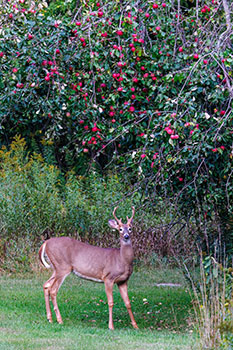Home → Fish & Wildlife → Wildlife → Living with Wildlife → How to Avoid or Resolve a Wildlife Conflict → Deer Management Assistance Program (DMAP)
Deer Management Assistance Program (DMAP)

The MDIFW deer management assistance program (DMAP) brings together management tools and information to help landowners manage their conflicts with white-tailed deer. This program is in development, and information about additional program elements will be added once completed.
Non-lethal Deer Conflict Management
When dealing with deer conflicts on your lands, non-lethal control is always the preferred approach, and in many situations the only appropriate one. A physical barrier such as a fence or tree caging will always provide the most effective protection, though fencing may not always be an option, such as when dealing with large fields or very remote areas. For more information about fencing to protect your property, visit our fencing web page. Other methods of non-lethal deer control include deterrents, hazing, and planting less palatable plant species. For more information on these control options, visit the How to Avoid or Resolve a Deer Conflict and Living with White-tailed Deer pages, contact DMAP administrators, or contact your nearest Regional MDIFW office to consult with a biologist.
Lethal Deer Conflict Management
In some cases, non-lethal control methods may prove ineffective, and lethal control may be warranted. Deer that are located within orchards or crops where deer have caused substantial damage may be taken or killed, night or day. Deer taken under these circumstances must be reported to the Maine Warden Service within 12 hours, and the carcass and meat must be immediately cared for. Contact a local game warden for more information before considering this option.
Permits may be issued to some landowners allowing the landowner or a designee to remove deer from the property, and these permits come in two types: depredation permits and DMAP permits. Depredation permits are for use outside of the regulated hunting seasons and may be used to address deer causing damage to any crops, orchards, and nursery trees. DMAP permits are for use during the regulated hunting seasons and relate only to situations where deer are or have been causing damage to commercial crops, orchards, or nursery trees.
Depredation Permits
When deer are causing damage to property outside of the regulated hunting seasons, lethal removal of problem deer via a depredation permit may be warranted. These permits may be issued by MDIFW regional biologists or Game Wardens after consultation with impacted landowners. Depredation permits are issued to impacted landowners, and the landowners may remove deer themselves or designate other people to remove deer from the impacted area. Other specifics of each depredation permit, such as how many deer may be taken, are determined on a case-by-case basis.
DMAP Permits
When deer are causing damage to commercial crops, orchards, or nursery trees during the regulated hunting seasons or when an owner of commercial crops, orchards, or nursery trees is seeking additional options to lower deer numbers locally and on their property using regulated hunting, DMAP permits may be an option worth considering. DMAP permits are issued to landowners to use on their own property or distribute to hunters for use on their property. These permits are provided free of charge and allow for the harvest of one additional antlerless deer from the designated property during the regulated deer hunting seasons aside from the expanded archery season. DMAP permits must be used in accordance with the laws and regulations of ongoing deer seasons.
DMAP permits will only be provided to commercial farmers of crops, orchards, or nursery trees that are experiencing significant deer damage to these crops, orchards, or nursery trees resulting in financial losses. Landowners must have a suitable land base for deer removal (10+ acres). Preference will be granted to landowners that allow public access to their land and that have worked with MDIFW before to control the problem using other lethal or non-lethal control methods. Landowners interested in obtaining DMAP permit(s) should first reach out to MDIFW by contacting DMAP administrators at DMAP.MDIFW@Maine.gov.
Deer taken by landowners or hunters using DMAP permits must be registered in accordance with all registration requirements of the regulated deer hunting seasons. Hunters registering deer taken under the authority of a DMAP permit should specify "DMAP" as the "season" when registering their deer, and they should use the DMAP permit number provided with their DMAP permit as the permit number at registration.
Landowner applications for DMAP permits must be submitted by August 10 to be considered for the same calendar year. Landowners receiving DMAP permits will need to identify the hunters that will be receiving their DMAP permits by September 1.
Finding Hunters and Finding Land
When landowners would like additional deer removed from their properties, it can be challenging to locate hunters. If you are a landowner that is interested in having additional hunters on your property or that has DMAP permits they'd like to distribute to hunters, and if you require assistance finding hunters to come to your property, please contact DMAP.MDIFW@Maine.gov.
Meat Donation
If you as a participating landowner or hunter are interested in donating meat from deer taken with depredation or DMAP permits, consider donating your deer to the Hunters for the Hungry program. Program meat processors fill up quickly and some may only cut meat seasonally, so donation may not always be possible.
Managing Expectations
As long as deer have existed alongside people and people have tried to grow things, there have been conflicts, and this will always be the case. For the best results, it will often serve you well to explore every opportunity available and deploy multiple strategies if possible. Never hesitate to reach out with questions, comments, or ideas.